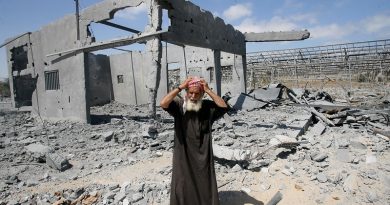Center for Peace and Conflict Studies Hosts Annual “All Conflict is Local” Conference
Meg Gawron
Associate Editor
On October 20 and 21, the Center for Peace and Conflict Studies hosted its fifth annual “All Conflict is Local: Personal Experience, Reflection, and Conflict Resolution” conference.
The Seton Hall University School of Diplomacy and International Relations’ Acting Dean, Dr. Courtney Smith, opened the meeting with an anecdote from when he was earning his doctorate degree. His advisor at the time gave him a single piece of advice: “Remember, you will learn from your students.” This rang especially true for Dean Smith as he introduced a panel that included both graduate students and alumni.
Over the course of two days, the conference featured three panels addressing different aspects of conflict. Dr. Zheng Wang, Director of the Center for Peace and Conflict Studies, emphasized that each panelist had experience with the conflict they would be presenting on. All conflict is local not just because it happens in communities, but because it involves individuals.
The first panel covered the development of organizations and infrastructure in regions of conflict. Brandon Kotlow, an alumnus of the School of Diplomacy, opened the first panel with a discussion on Nigerian police reform. Kotlow works as a Program Officer for Strategic Capacity Group (SCG) and focuses on law enforcement. In response to abuses of power by the Nigerian police forces, especially by the Special Anti-Robbery Squad, SCG is working to restructure Nigeria’s police force to eliminate the system the Nigerian people have grown to hate.
Kotlow emphasized that the most important aspect of attempting police reform in Nigeria is gaining citizens’ trust. Rather than implementing a new kind of law enforcement through a commanding top-down structure, SCG is opting to use trust building as a bottom-up way of creating a new police force.
Kyle Jensen, the second panelist and a current graduate student, discussed the impact of water insecurity in Ankazomenavony, a village in the Mahajanga region of Madagascar. Jensen served as a Peace Corps Volunteer in the region, where he witnessed how the lack of infrastructure affects people’s lives.
While Jensen worked to help the community grow gardens to alleviate food insecurity, he notes that the most important work he did was social. He highlighted his work in the community, through which he built trust with the local people and worked to understand their underlying needs. The idea of community dominated his section of the panel, serving as a means for him to connect with the region and as a forum for each impacted individual to discuss solutions to the region’s water insecurity.
The third panelist, Parawish Abbasi, shifted the conversation from Africa to Asia and focused on Pakistan. Pakistan is at a high risk for natural disasters, especially earthquakes, which only amplifies threats to the state’s security. In 2010, Abbasi was inspired to join the humanitarian sector when her home village in Pakistan was evacuated for fear of an earthquake. She described that earthquakes that year damaged over 189 million homes, which only strengthened her resolve to pursue humanitarianism.
Continuing the other panelists’ discussion of interpersonal connections, Abbasi emphasized that “simply knowing things is not enough.” She entered the field with ample amounts of technical knowledge, but what she found most beneficial in these disasters was connecting with the local people.
The next two panels in the conference covered civil strife and divided societies. While the first panel was connected by the thread of trust and community, the following panels appeared more disparate at first. In response to this, Kassi Bourne, a graduate student, remarked, “On the surface, the presentations did not seem to go together, but Dr. Wang was able to point out the importance of history in each of them. These histories remind us of the root of the conflicts and helps us to find new solutions.”


